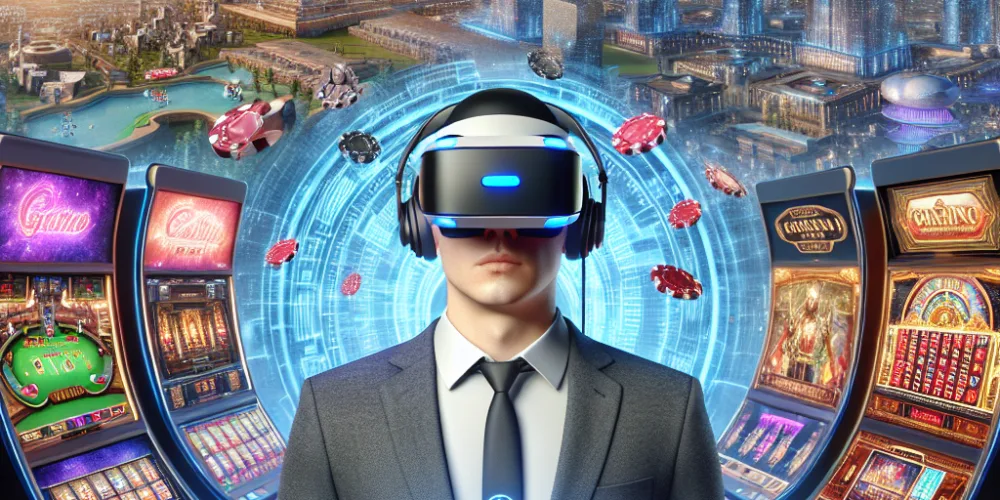In the fast-evolving world of gaming, the distinction between virtual experiences and reality is becoming ever more blurred. Casinos, traditional bastions of games of chance and skill, are undergoing a dramatic transformation, embracing the digital age. The advent of Virtual Reality (VR) technology is possibly the most exciting development yet, promising to revolutionize the way we think about and engage with gambling environments. This article delves into the emerging trend of VR casinos, exploring how they are shaping the future of gaming and what this means for players and the industry at large.
Virtual reality casinos are no longer just a fanciful concept. They are real, operational, and gaining traction rapidly among tech-savvy gamblers. As VR headsets become more accessible and affordable, and as internet technology continues to advance, the experience of visiting a casino is being recreated in stunning detail within the comfort of one’s home. These platforms offer a full-immersion experience that replicates walking through a casino’s doors, sitting at a slot machine, or standing at a roulette table, complete with the ability to interact with dealers and other players.
One of the key drivers behind the adoption of VR in casinos is the enhanced user experience it offers. Traditional online casinos have long provided the convenience of playing from home but lacked the engaging, social atmosphere of a physical casino. VR casinos bridge this gap by offering interactive, communal experiences. Players can observe each other’s avatars, communicate in real time, and even read body language, adding layers of strategy and enjoyment that were previously exclusive to in-person gambling.
The technology also enables an unprecedented level of detail in the gaming environment. From the intricate designs on a slot machine to the plush carpets and ornate chandeliers, everything in a VR casino is designed to replicate the opulent, exhilarating atmosphere of a real-world casino. This attention to detail extends to the games themselves. For instance, players can see the ball spin in a roulette wheel and watch cards being dealt from a shoe, each movement rendered realistically, enhancing the thrill of the gamble.
However, the integration of VR into gaming also presents challenges, particularly in the realm of regulation and security. Ensuring fair play and preventing underage gambling in a digital space that crosses international borders is complex. Regulators are still catching up with these technological innovations, working to adapt existing laws to new realities. Security measures must also be stringent, as VR casinos collect a significant amount of personal data to create deeply personalized experiences.
From an economic perspective, VR casinos represent a significant growth opportunity for the gaming industry. According to recent market analyses, the VR gambling sector is expected to witness substantial growth over the next decade. This growth is driven not only by technological advancements but also by changes in consumer behavior, with younger demographics showing increased interest in immersive and interactive forms of entertainment. Casinos that adopt VR technology can attract this key demographic, securing a new revenue stream in an increasingly competitive market.
Moreover, VR casinos have the potential to drive innovation in other areas of gaming and entertainment. As these platforms become more sophisticated, the technology used to power them could spill over into other forms of VR applications, influencing sectors as diverse as education, real estate, and travel.
As we look toward the future, the trend towards more immersive, personalized, and interactive gaming experiences is unmistakable. Virtual Reality casinos are at the forefront of this movement, offering a glimpse into the future of entertainment. While challenges remain, the potential for growth and innovation is vast, promising an exciting new chapter in the world of gaming.
In sum, as VR technology continues to evolve and become more integrated into our everyday lives, the line between the virtual and the real will increasingly blur, reshaping industries and user experiences. For the casino industry, this represents both a challenge and an opportunity—an opportunity to redefine gambling for the digital age and deliver experiences that are not only entertaining but truly transformative.

Karine Gomez is an enthusiastic writer and avid gamer with a particular love for PlayStation and casino gaming. Her deep knowledge of gaming trends and casino dynamics makes her articles both informative and engaging. Karine’s passion for PlayStation games and her firsthand experience with casino play shine through in her writing, offering readers authentic insights and valuable tips.

